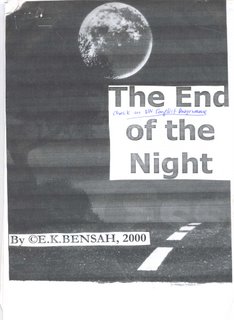The Multi-Facetted Mortification of the Ignoble Kind

The news that Saddam Hussein will face genocide charges is welcome news, which you can read here:
"BAGHDAD, Iraq - The Iraq tribunal Tuesday announced new criminal charges against Saddam Hussein and six others for alleged genocide and crimes against humanity in the 1980s crackdown against the Kurds, including the gassing of thousands of civilians in the village of Halabja."
Contrasting this news against that of the egregious war criminal (though that's a bit of an oxymoron) Charles Taylor, it reminds me of how cowards die many times before their death.
Think: Saddam hiding himself in a hole-ok, a "tiny cellar"; Taylor being caught at the border between Cameroon and Nigeria the day of the eclipse in the West African sub-region. I am re-posting an article I wrote for my college newspaper back in 1999--under the pseudonym of "max Sunrise" about Milosevic:
The Leaders should try to avoid another Versailles
At the time of writing, the Nato threat to launch air-strikes have been suspended, and the decisions have been postponed, if not suspended, till next they meet in March. Then, perhaps, another threat of air-strikes will be made.
This is getting a bit too much, isn't it? These people in the castle aren't children fighting over who stole the chocolate, and who got hit. These are real lives, real people fighting for a real cause. They need time, patience, diplomacy at its highest, and a combination of all these, plus high-level discussions to produce a palatable compromise. Instead, one has seen things go wrong: rumours alluding to the idea that some of the delegations, upon which the discussions are incumbent, have leaked information to the Press with their mobile phones. Madeleine Albright, the US Secretary-of-State, has been seen jetting here and there, throwing out the usual flights of rhetoric - if no decision is made, Nato troops will be ready to act - and furthermore, the Serbs have expressed dissatisfaction with their part of the deal. Could history possible be repeating itself, a month later?
Eighty years ago, in January, the Statesmen of the time also met in France - at Versailles - to carve up Europe. It was dissatisfaction by the Germans with the harshness of the compromise that ultimately precipitated the rise of Hitler, who later called Versailles a diktat and dolchstoss. Let us hope that these leaders do not make the mistake of trying to force deals with either the Serbs or the Albanians, or the ramifications of an adverse result could lead to disaster.
Negotiation is an art, and it would be foolhardy for one to believe that the Six Contact Group, attending the conference are amateurs, but the problem is these statesmen don't seem to listen to the political scientists and historians out there who make a daily analysis of the politics of the international system. These people have the precedents at their fingertips; they know that you cannot force enemies to sit together by bungling them together in a fancy castle. Versailles ought to be enough of a reminder that things can go seriously wrong.
That said, the impression one gets is that they feel one type of conflict resolution - Dayton Peace Accords brokered by Richard Holbrooke in Ohio, 1995 - is equally applicable to the case of Kosovo. These people may look the same, talk the same and argue with the same intensity as the Bosnians, but they are Kosovars, Albanians, etc. and their history is different. Most importantly, their lives have been thrown upside down by the master criminal behind all the problems: Slobodan Milosevic.
This man is responsible for having repealed the autonomy that was granted to Kosovo, in 1989. Yugoslavia had originally granted the Serbian province of Kosovo autonomy in 1974. Yet Milosevic has single-handedly altered the lives of over million people, and in the process, whipped up the notion of superiority of one ethnic group over the other. His invective has ultimately triggered ethnic cleansing of the dimensions encountered during the Bosnian War of 1991-95.
The statesmen in the castle of Rambouillet should keep in mind what Oscar Wilde wrote -- that "the systems that fail, are those that rely on the permanency of human nature". Agreements, such as Dayton Peace Accords, made under pressure have a high likelihood to result in a nuanced peace. In other words, human nature is inherently bad, and all sides have the potential to run out of patience. However, I believe that patience and increased diplomacy, rather than threats to strike, is what is needed. Simply put, empathy and understanding must play a superlative role if negotiation is to succeed.
The rap artist, Coolio, perhaps was right: "we keep spending most of our lives living in a gangsta's paradise". In the case of Kosovo, the "gangsta" has long been President Milosevic. If negotiations break down, he will be the one to go unscathed in the face of all the killings. It is paramount that the negotiators proclaim the death knell of this particular gangsta's paradise.
©Max Sunrise 1999.
from: http://members.tripod.com/~Max_Sunrise/writer-essay7.html
For whom the bell tolls? one wonders...for war criminals, that's who!! Quite why the US government wants to distance itself from the working of the International Criminal Court, mooted in 1998, remains less a mystery, and more the case of the US government being what historian Norman Rich described, in his classic book "Great Power Diplomacy 1814-1914" about 19th century statesman Bismarck: :"an exponent of a modern and amoral realpolitik".







0 Comments:
Post a Comment
Subscribe to Post Comments [Atom]
<< Home